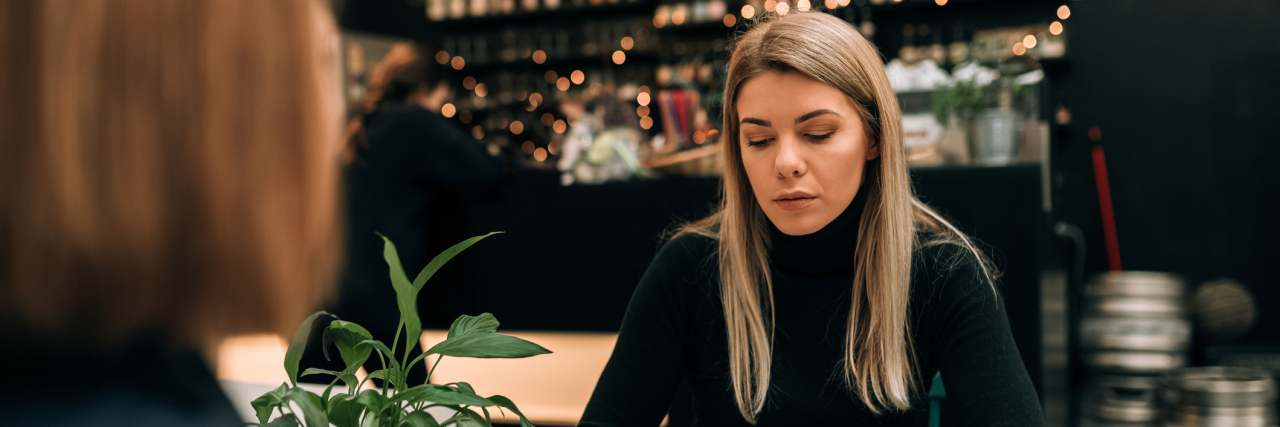When My Friend With Cancer Said She Understood My Chronic Illness Pain
I’m not sure about you, but none of my “healthy” friends understand what I truly go through living with invisible chronic illnesses and pain. Obviously, they are aware I have some medical issues. They see me at casual dinners for a couple hours here and there, and we talk on the phone or text during the week. During our interactions, however, (like the good chronic illness patient I am), I put on my social warrior mask and fake being well for their comfort. In short, there’s no amount of explanation that will ever enable them to understand the symptoms and pain that we, as invisibly chronically ill patients, contend with on a 24/7 basis.
So, you can imagine my surprise when my dear friend — who was recently diagnosed with rare and aggressive bile duct cancer — told me she finally understood more of what I was dealing with, specifically in reference to my symptoms of fatigue. In that moment, I felt validated, gobsmacked and incredibly saddened all at once. It wasn’t a good feeling to know she had to experience symptoms I experience to understand my plight better. Rather, I just felt sad and angry she has to go through them at all.
At this point, my friend has just completed her 12th week of chemotherapy. Keep in mind, she is only in the initial stages of her battle. Already, she has had devastating bouts of fatigue and sleep deprivation to the point of exhaustion, dizziness, nausea and hair loss. Like many of us with multiple chronic illnesses and pain, these are also symptoms I struggle with on a constant basis, most prominently, bone-crushing fatigue and “painsomnia.”
Of course, because I have educated her about some of my symptoms in the past, she was aware at least intellectually of what I go through, and has always been extremely supportive. But it wasn’t until she went through some of them herself, that she told me she could truly empathize and understand just how difficult life is for me. She told me she doesn’t know how I deal with these symptoms 24/7 for as long as I’ve been dealing with them, as she is struggling experiencing them for 12 weeks (and counting). She also told me how much she respected me for coping so well. She also wanted any advice I had for making the symptoms better. In that moment, I was glad I could do something to help.
Now granted, I have been dealing with chronic illnesses and pain for many years, so I have learned better ways of managing my symptoms and pain. Since she is brand new to these symptoms, coupled with a potentially life-threatening cancer, it’s safe to say we’re not comparing apples to apples here.
But, I thought it was important to write this article for a couple of reasons and pass on some words of wisdom:
1. It is impossible for our healthy friends to understand what we go through. In times past, I would get frustrated trying to explain my symptoms and pain (and the invisibility of them) to people who have never experienced these issues. Having learned that is usually a fruitless endeavor, I don’t worry about it too much anymore.
2. I’m grateful for friends and family who are sensitive to my health issues in spite of never having gone through anything like them. Conversely, I am blessed when I realize who is not sensitive to my health needs whether they’ve gone through anything similar or not. Living with chronic illnesses and pain can help us realize who our truly supportive friends really are — and are not.
3. When you have a precious friend who is going through so much, yet still takes the time to acknowledge your struggle, that’s a friend worth having.
4. Throughout my decade-plus of living with chronic illnesses and pain, I have come to realize everyone is going through something. Additionally, everyone processes pain and loss differently. Support may not always be shown in the way you want it to be.
5. Just because I am struggling with my own difficulties doesn’t mean I cannot be a supportive friend to someone else and help them through their pain and struggle. It may be that my own pain has enabled me to be the supportive friend they need.
6. Each of us is more alike in our pain (whatever that may be) than we are different. Use those commonalities to develop true empathy and compassion instead of judgment and skepticism for others.
7. Don’t judge a book by its cover. Until you’ve walked in someone else’s shoes, you don’t know what they’re truly going through (quote my friend’s father used to always tell her).
This article is dedicated to my friend. You know who you are. To your continued fight, health and healing — I love you and I’m here for you every step of the way!
Getty image by nortonrsx

